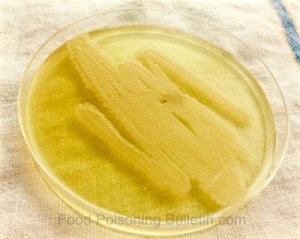Researchers at Kansas State University are studying how the E. coli O157:H7 bacteria blocks the human immune system to cause illness. The bacteria uses proteins to block the immune system, letting it multiply and release toxins into the bloodstream.
 Dr. Philip Hardwidge is the lead scientists for this study. He said, “in terms of infectious disease, this inhibition of the human innate immune response is absolutely critical for the bacteria’s ability to cause an infection. If we can identify choke points in the interaction between the bacterium and the host, we may be able to inhibit the bacterium and prevent its survival in an infected human being.”
Dr. Philip Hardwidge is the lead scientists for this study. He said, “in terms of infectious disease, this inhibition of the human innate immune response is absolutely critical for the bacteria’s ability to cause an infection. If we can identify choke points in the interaction between the bacterium and the host, we may be able to inhibit the bacterium and prevent its survival in an infected human being.”
The National Institutes of Health is providing the grant for this study. Scientists are looking at a protein the bacteria expresses called NleH1. Hardwidge said, “this protein is one example of an injected bacterial protein that is able to block the innate immune system. This protein has kind of an unusual mechanisms that had not been seen in other bacterial or viral pathogens, so we’re interested in understanding more about how this protein really works and whether it represents a good target for future therapeutics.
The research may also be used in the study of other diseases. The protein could be used as a therapy to fight autoimmune diseases such as cancer and diabetes, which may be caused by an overactive component of the immune system.




